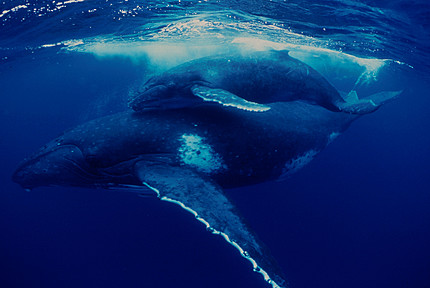Advait Jukar & Laura Bradley
Reed College
Ontogeny
Behavioral ontogeny: the development of a particular behavior in the life history of an organism.
To talk about the development of a behavior is challenging--certainly the field of molecular biology has not yet elucidated precisely how behavioral phenotypes arise. Migration is primarily a learned behavior in humpback whales. It has been reported that the young accompany their mothers on initial migrations and mimic the routes for the rest of their lives (Rendell & Whitehead 2001). The offspring generally learn the route to a specific feeding ground within the first year of life, during which they spend time almost exclusively with their mother (Clapham and Mayo 1990, Baraff & Weinrich 1993). As the offspring mature, they gain independence from their mothers. In a study examining foraging diving behavior in mother-offspring pairs, it was observed that as the feeding season progresses, mothers become less responsive to their young and the offspring become more adapt at synchronizing their dives with their mothers (Szabo & Duffus 2007).

Evidence from mitochondrial DNA
The familial relationship within pods suggests that migration is learned in a family. Analysis of humpback whale mitochondrial (mt) DNA demonstrates that individual pods contain genetically related whales. The mtDNA haplotype is inherited from the mother only, providing a genetic marker from which to construct a maternal lineage. Studies generally analyze mtDNA obtained from skin biopsies that contains a hypervariable non-coding region. It has been observed that humpback whales within a pod are more likely to carry the same haplotype than expected by random association (Weinrich et al 2006). These data suggest that familial relations govern the development of migration behavior in humpbacks.